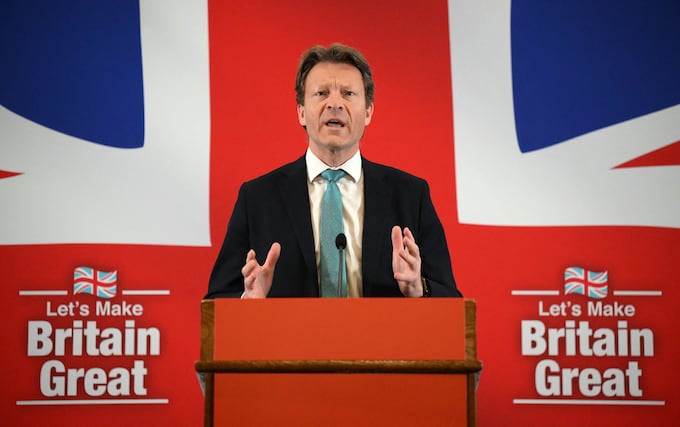Tory Chairman's Stand Against Populism Creates Reform UK Rift

Table of Contents
The Tory Chairman's Anti-Populism Stance
The recent conflict within Reform UK stems directly from the Tory chairman's vocal rejection of certain populist policies and rhetoric within the party. While specific statements haven't been publicly released in full, sources suggest the chairman expressed concerns about the potential long-term damage to the party's credibility. The chairman's rationale, reportedly, centers on the belief that certain populist approaches could alienate moderate voters and ultimately hinder Reform UK's ability to achieve its long-term goals.
- Specific policies opposed: Unconfirmed reports suggest the chairman voiced concerns about specific populist policies concerning immigration and nationalization, believing them to be too divisive and unrealistic.
- Long-term concerns: The chairman reportedly fears that an overly populist approach would damage the party's reputation for being a serious political force, attracting only a small, highly-polarized base.
- Damage to the party's image: The chairman's internal criticism has reportedly raised concerns about the party's ability to appeal to a broader electorate, potentially affecting its image as a viable alternative to the established parties.
The Fracturing of Reform UK
The chairman's anti-populism stance has ignited a firestorm within Reform UK, exposing deep ideological divisions. Different factions within the party have reacted sharply, with some publicly supporting the chairman's more measured approach and others vehemently defending a more populist platform. Key figures within the party are now openly at odds, fueling speculation about potential power struggles and internal restructuring.
- Statements from prominent members: While many statements remain behind closed doors, leaked information suggests a significant disagreement between those who favor a more pragmatic approach and those who believe that a robust populist stance is vital for Reform UK's success.
- Evidence of internal power struggles: The conflict has highlighted underlying tensions and power dynamics within the party, suggesting deeper fractures beneath the surface.
- Potential splits or expulsions: The gravity of the situation leaves open the possibility of significant splits or even expulsions from the party, resulting in a further fragmentation of the Reform UK movement.
Impact on the Wider Political Landscape
The internal struggle within Reform UK has significant implications for the UK's political landscape. The party's instability directly affects its standing amongst voters, potentially influencing public opinion and the outcomes of future elections. Furthermore, this conflict could serve as a case study for other political parties, impacting their strategies and internal dynamics.
- Shift in public opinion: The internal conflict has undoubtedly decreased public trust in the party's stability and its ability to present a credible alternative.
- Impact on upcoming elections: The turmoil threatens Reform UK's ability to effectively campaign and mobilize support for upcoming local and national elections.
- Effect on rival parties: Established parties are likely to monitor the situation closely, potentially adjusting their own strategies to exploit the internal weaknesses of Reform UK.
The Future of Reform UK
The future of Reform UK remains uncertain. The current conflict could lead to several scenarios, ranging from internal reconciliation and a renewed focus on unity to a complete fracturing of the party. The role of leadership in navigating this crisis will be paramount in determining the party's long-term trajectory and electoral prospects.
- Potential scenarios: These range from a compromise and a renewed focus on unifying policies to a permanent split, creating two or more competing factions.
- The role of leadership: The party's leadership must urgently address these internal divisions and find a path towards unity or manage a controlled split to minimize damage.
- Long-term impact on electoral prospects: The party's ability to overcome this crisis will significantly impact its long-term electoral viability and its ability to compete effectively in the future.
Conclusion: Tory Chairman's Stand Against Populism Creates Ongoing Reform UK Rift
The Tory chairman's anti-populism stance has created a profound and potentially devastating rift within Reform UK. The consequences of this internal struggle are far-reaching, threatening the party's stability, its public image, and its capacity to compete effectively in the UK's political arena. The impact extends beyond Reform UK, influencing the wider political landscape and potentially shaping the strategies of other parties. What are your thoughts on the Reform UK rift? Stay updated on this ongoing political drama and share this article to spread awareness of the conflict within Reform UK.

Featured Posts
-
 La Matinale De Mathieu Spinosi Le Violon En Direct
May 03, 2025
La Matinale De Mathieu Spinosi Le Violon En Direct
May 03, 2025 -
 Analysis Abu Jinapor And The Npps 2024 Election Setback
May 03, 2025
Analysis Abu Jinapor And The Npps 2024 Election Setback
May 03, 2025 -
 The Importance Of Mental Health Literacy Education In Schools And Communities
May 03, 2025
The Importance Of Mental Health Literacy Education In Schools And Communities
May 03, 2025 -
 Intelligence Artificielle Macron Et Le Patriotisme Economique Europeen
May 03, 2025
Intelligence Artificielle Macron Et Le Patriotisme Economique Europeen
May 03, 2025 -
 Ai Chip Exports Nvidia Ceos Appeal To The Trump Administration
May 03, 2025
Ai Chip Exports Nvidia Ceos Appeal To The Trump Administration
May 03, 2025
